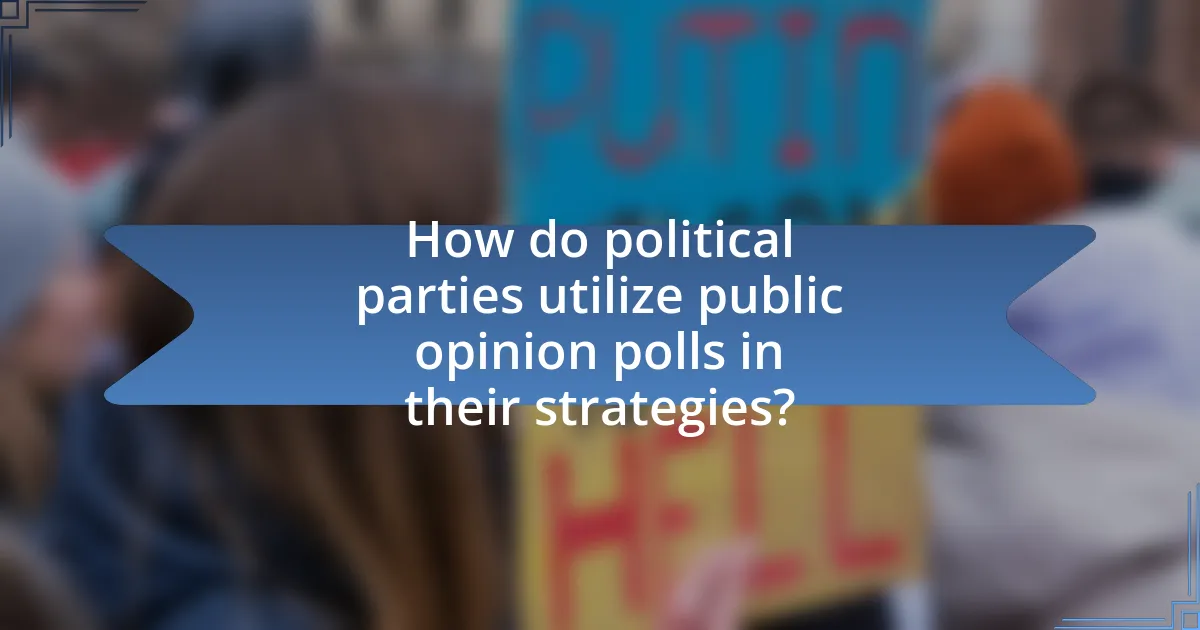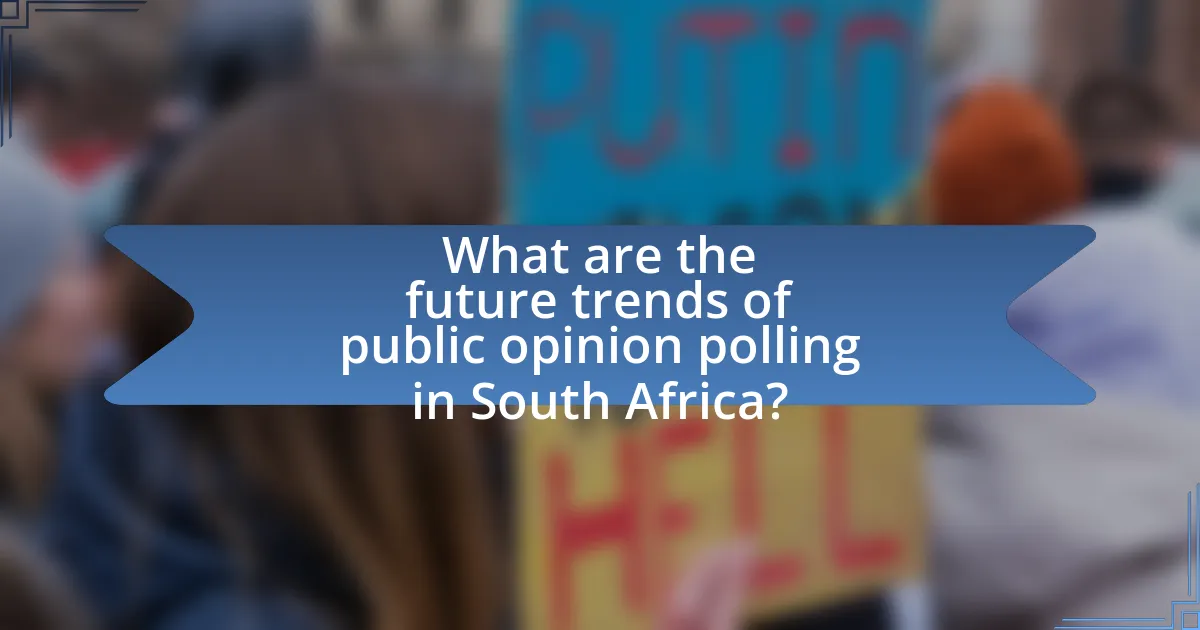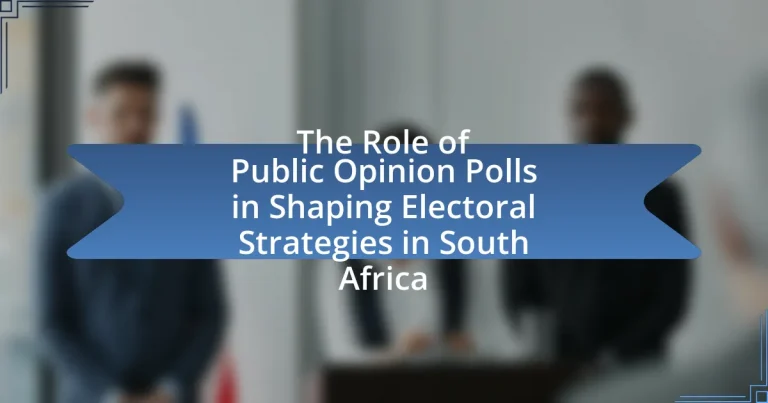Public opinion polls are a vital component in shaping electoral strategies in South Africa, providing political parties with insights into voter preferences and sentiments. These polls help identify key issues that resonate with the electorate, allowing parties to tailor their campaigns effectively, as demonstrated during the 2019 national elections. The article explores how public opinion polls influence political party decisions, the methodologies used in conducting these polls, and their impact on campaign messaging and voter engagement. Additionally, it addresses the challenges and limitations of polling in accurately predicting electoral outcomes, as well as future trends in polling methodologies, particularly the role of technology and social media.
What is the role of public opinion polls in South Africa’s electoral strategies?
Public opinion polls play a crucial role in shaping electoral strategies in South Africa by providing political parties with insights into voter preferences and sentiments. These polls help parties identify key issues that resonate with the electorate, allowing them to tailor their campaigns effectively. For instance, during the 2019 national elections, various polls indicated that issues such as unemployment and corruption were top concerns for voters, prompting parties to focus their messaging on these topics. Additionally, polls assist in gauging the effectiveness of campaign strategies and adjusting them in real-time, which can significantly influence electoral outcomes.
How do public opinion polls influence political party decisions?
Public opinion polls significantly influence political party decisions by providing insights into voter preferences and sentiments. Political parties utilize these polls to gauge public support for policies, candidates, and electoral strategies, allowing them to adjust their platforms accordingly. For instance, in South Africa, the African National Congress (ANC) has historically relied on polling data to shape its campaign strategies, responding to shifts in public opinion to maintain electoral competitiveness. This reliance on polls is evident in the ANC’s adjustments to its messaging and policy focus in response to declining approval ratings, as seen in the 2019 national elections where they aimed to address issues highlighted by polling data, such as corruption and service delivery.
What methodologies are used in conducting public opinion polls?
Public opinion polls utilize various methodologies, including surveys, focus groups, and observational studies. Surveys, often conducted via telephone, online platforms, or face-to-face interviews, gather quantitative data from a representative sample of the population. Focus groups provide qualitative insights by facilitating discussions among selected participants to explore their opinions in depth. Observational studies analyze behaviors and trends without direct interaction with respondents. These methodologies are validated by their widespread use in political research, demonstrating their effectiveness in capturing public sentiment and influencing electoral strategies.
How do polling results shape campaign messaging?
Polling results shape campaign messaging by providing candidates with data on voter preferences and sentiments, allowing them to tailor their communication strategies effectively. For instance, if polls indicate that voters prioritize economic issues, campaigns may emphasize economic policies and solutions in their messaging. This strategic alignment with public opinion can enhance voter engagement and support. Historical examples in South Africa, such as the African National Congress adjusting its messaging based on polling data during the 2019 elections, demonstrate how campaigns can pivot their focus to resonate with the electorate’s current concerns, thereby increasing their chances of electoral success.
Why are public opinion polls significant in South African elections?
Public opinion polls are significant in South African elections because they provide critical insights into voter preferences and trends, influencing campaign strategies. These polls help political parties gauge public sentiment, allowing them to tailor their messages and policies to resonate with the electorate. For instance, during the 2019 national elections, polls indicated a decline in support for the African National Congress, prompting the party to adjust its campaign focus to address voter concerns about corruption and service delivery. This responsiveness to polling data demonstrates how public opinion can shape electoral strategies and ultimately impact election outcomes.
What historical context underpins the use of polls in South Africa?
The historical context underpinning the use of polls in South Africa is rooted in the country’s transition from apartheid to a democratic society in the early 1990s. This transition necessitated a new political landscape where public opinion became crucial for understanding voter preferences and shaping electoral strategies. The first democratic elections in 1994 marked a significant shift, as political parties began to rely on polling data to gauge public sentiment and tailor their campaigns accordingly. The establishment of the Electoral Commission of South Africa further institutionalized the use of polls, ensuring that they became a standard tool for measuring public opinion and influencing political discourse.
How do public opinion polls reflect voter sentiment?
Public opinion polls reflect voter sentiment by systematically measuring the preferences and attitudes of a population regarding political candidates and issues. These polls utilize scientifically designed surveys to gather data from a representative sample of voters, allowing analysts to gauge public opinion at a given time. For instance, a poll conducted by the South African Institute of Race Relations in 2023 indicated that 65% of respondents favored a specific political party, demonstrating a clear preference that can influence electoral strategies. This data provides political parties with insights into voter priorities and concerns, enabling them to tailor their campaigns effectively.
What challenges do public opinion polls face in South Africa?
Public opinion polls in South Africa face significant challenges, including issues of representativeness, political bias, and methodological limitations. The diverse demographic landscape of South Africa complicates the ability to obtain a sample that accurately reflects the population, leading to potential skewing of results. Additionally, political bias can influence both the design of polls and the interpretation of results, as various stakeholders may have vested interests in promoting certain narratives. Methodological limitations, such as reliance on telephonic surveys in a country with varying access to technology, further exacerbate the accuracy of polling data. These factors collectively undermine the reliability of public opinion polls in informing electoral strategies.
How do biases in polling affect electoral outcomes?
Biases in polling can significantly distort electoral outcomes by misrepresenting public opinion. When polls are conducted with biased methodologies, such as non-random sampling or leading questions, they can produce results that favor certain candidates or parties, leading to skewed perceptions of voter support. For instance, if a poll over-represents a demographic that favors a particular party, it may create an illusion of greater electoral viability for that party, influencing campaign strategies and voter turnout. Historical evidence from the 2016 U.S. presidential election shows that many polls underestimated support for Donald Trump, which contributed to unexpected electoral results. This illustrates how polling biases can mislead both candidates and voters, ultimately shaping the dynamics of electoral contests.
What are the limitations of public opinion polls in predicting election results?
Public opinion polls have significant limitations in predicting election results, primarily due to sampling errors, response biases, and the dynamic nature of voter sentiment. Sampling errors occur when the poll does not accurately represent the population, leading to skewed results; for instance, a poll may over-represent certain demographics while under-representing others, which can mislead predictions. Response biases arise when respondents provide socially desirable answers rather than their true preferences, affecting the reliability of the data collected. Additionally, voter sentiment can change rapidly due to emerging issues or events, making polls taken weeks or months before an election less reliable. Historical examples, such as the 2016 U.S. presidential election, illustrate these limitations, where many polls failed to predict the outcome accurately due to these factors.

How do political parties utilize public opinion polls in their strategies?
Political parties in South Africa utilize public opinion polls to inform their electoral strategies by assessing voter preferences and sentiments. These polls provide critical data that help parties identify key issues, gauge public support for policies, and tailor their messaging to resonate with constituents. For instance, during the 2019 national elections, the African National Congress (ANC) and the Democratic Alliance (DA) relied on polling data to adjust their campaign strategies, focusing on issues that polls indicated were most important to voters, such as unemployment and corruption. This strategic use of polling allows parties to allocate resources effectively and enhance their chances of electoral success.
What strategies do parties employ based on polling data?
Political parties in South Africa employ various strategies based on polling data to enhance their electoral performance. These strategies include adjusting campaign messaging to align with voter preferences, reallocating resources to target key demographics identified through polls, and modifying candidate appearances and public engagements to resonate with constituents. For instance, the African National Congress (ANC) has historically shifted its focus on issues such as economic inequality and service delivery in response to polling data indicating voter concerns. Additionally, parties may utilize polling data to identify swing regions, allowing them to concentrate their efforts where they can gain the most votes. This data-driven approach is evident in the 2019 elections, where the Democratic Alliance (DA) tailored its campaign to address specific local issues highlighted in polls, ultimately influencing voter turnout and party support.
How do parties adjust their platforms in response to poll findings?
Parties adjust their platforms in response to poll findings by analyzing voter preferences and shifting their policies to align with public sentiment. For instance, if polls indicate strong support for social welfare programs, parties may emphasize or expand their commitments to such initiatives in their platforms. This strategic alignment is evident in South Africa, where parties like the African National Congress have modified their stances on issues such as land reform and economic inequality based on polling data. Historical trends show that parties often prioritize issues that resonate with the electorate, thereby enhancing their chances of electoral success.
What role do polls play in candidate selection and positioning?
Polls play a critical role in candidate selection and positioning by providing insights into public opinion and voter preferences. These surveys help political parties identify which candidates resonate with the electorate, allowing them to strategically select individuals who are more likely to win elections. For instance, in South Africa, polls have historically influenced party leadership decisions, as seen in the African National Congress’s (ANC) candidate selection process, where polling data guided the nomination of candidates perceived as favorable by voters. This reliance on polling data ensures that candidates align their messaging and campaign strategies with the interests and concerns of the electorate, thereby enhancing their chances of electoral success.
How do public opinion polls affect voter engagement?
Public opinion polls significantly influence voter engagement by shaping perceptions of candidate viability and public sentiment. When polls indicate a candidate is leading, it can motivate supporters to engage more actively, believing their vote will contribute to a winning outcome. Conversely, polls showing a candidate trailing may discourage potential voters from participating, as they perceive their vote as less impactful. Research by the Pew Research Center highlights that individuals are more likely to vote when they believe their preferred candidate has a realistic chance of winning, demonstrating the direct correlation between poll results and voter motivation.
What impact do polls have on voter turnout?
Polls significantly influence voter turnout by shaping public perception and engagement. Research indicates that when polls show a candidate leading, it can create a bandwagon effect, motivating supporters to vote to ensure their candidate’s success. Conversely, polls indicating a close race can spur increased turnout among undecided voters who feel their participation is crucial. A study by the Pew Research Center found that in competitive elections, voter turnout can increase by as much as 5-10% when polls highlight a tight race. This demonstrates that the visibility and interpretation of polling data play a critical role in mobilizing voters in South Africa’s electoral landscape.
How do polls influence public perception of candidates?
Polls significantly influence public perception of candidates by providing measurable insights into voter preferences and sentiments. When polls indicate a candidate’s popularity or lead, it can create a bandwagon effect, where undecided voters are swayed to support the leading candidate, believing they are more likely to win. For instance, a study by the Pew Research Center found that 70% of voters are influenced by polling data, often aligning their choices with perceived frontrunners. Additionally, negative polling results can damage a candidate’s image, leading to decreased support and increased scrutiny from the media and opponents. This dynamic illustrates how polls serve as both a reflection of and a catalyst for public opinion in electoral contexts, particularly in South Africa’s competitive political landscape.

What are the future trends of public opinion polling in South Africa?
Future trends of public opinion polling in South Africa indicate a shift towards increased use of technology and data analytics. Polling organizations are likely to adopt advanced methodologies, such as online surveys and mobile polling, to capture a more diverse demographic. The rise of social media analytics will also play a crucial role, allowing pollsters to gauge public sentiment in real-time. Additionally, there is a growing emphasis on transparency and methodological rigor to enhance credibility, as seen in recent calls for more detailed disclosures of polling techniques and sample sizes. These trends reflect a broader global movement towards more agile and responsive polling practices, aligning with the evolving political landscape in South Africa.
How is technology changing the landscape of public opinion polling?
Technology is transforming public opinion polling by enhancing data collection methods and improving analysis capabilities. The advent of online surveys and mobile polling applications allows for quicker and more cost-effective data gathering, reaching a broader demographic, particularly younger voters who predominantly use digital platforms. Additionally, advanced analytics and machine learning algorithms enable pollsters to interpret complex data sets more accurately, leading to more nuanced insights into voter behavior and preferences. For instance, a 2021 study by the Pew Research Center highlighted that 60% of Americans prefer online surveys over traditional methods, indicating a significant shift in how public opinion is measured. This technological evolution not only increases the efficiency of polling but also enhances the reliability of the results, ultimately shaping electoral strategies in South Africa and beyond.
What innovations are emerging in polling methodologies?
Innovations in polling methodologies include the use of advanced data analytics, mobile polling, and social media sentiment analysis. Advanced data analytics allows pollsters to process large datasets quickly, improving accuracy and predictive capabilities. Mobile polling leverages smartphones to reach a broader demographic, particularly younger voters, enhancing participation rates. Social media sentiment analysis utilizes algorithms to gauge public opinion in real-time, providing insights that traditional polling methods may miss. These innovations are supported by studies showing increased engagement and more representative samples, thereby refining electoral strategies in South Africa.
How might social media influence public opinion polling in the future?
Social media will likely enhance the speed and accessibility of public opinion polling in the future. As platforms like Twitter and Facebook facilitate real-time engagement, they provide immediate feedback on public sentiment, allowing pollsters to gather data more rapidly and efficiently. For instance, a study by Pew Research Center indicates that 69% of adults in South Africa use social media, which can significantly influence how polling data is collected and interpreted. This shift may lead to more dynamic polling methodologies that adapt to trends and discussions occurring online, ultimately shaping electoral strategies in response to the evolving landscape of public opinion.
What best practices should be followed for effective public opinion polling?
Effective public opinion polling requires adherence to several best practices, including ensuring a representative sample, using clear and unbiased questions, and employing appropriate data analysis techniques. A representative sample is crucial as it reflects the demographics of the population, which enhances the validity of the results; for instance, a study by the Pew Research Center emphasizes that diverse sampling leads to more accurate insights into public sentiment. Clear and unbiased questions prevent leading respondents toward a particular answer, thereby increasing the reliability of the data collected. Additionally, employing rigorous data analysis techniques, such as weighting responses to account for demographic discrepancies, ensures that the findings accurately represent the broader population’s views. These practices collectively contribute to the effectiveness of public opinion polling, particularly in contexts like South Africa, where understanding diverse perspectives is essential for shaping electoral strategies.
How can polling organizations ensure accuracy and reliability?
Polling organizations can ensure accuracy and reliability by employing rigorous sampling methods, utilizing well-designed questionnaires, and implementing statistical analysis techniques. Rigorous sampling methods, such as random sampling, help to create a representative sample of the population, which is crucial for obtaining valid results. Well-designed questionnaires minimize bias and confusion, ensuring that respondents understand the questions clearly, which enhances the quality of the data collected. Statistical analysis techniques, including weighting and margin of error calculations, allow organizations to interpret results accurately and account for potential biases. For instance, a study by the Pew Research Center found that using random digit dialing and stratified sampling significantly improved the accuracy of polling results in various demographics.
What ethical considerations should be taken into account in polling?
Ethical considerations in polling include ensuring informed consent, maintaining respondent anonymity, and avoiding bias in question phrasing. Informed consent requires that participants understand the purpose of the poll and how their data will be used, which is crucial for ethical transparency. Anonymity protects respondents from potential repercussions, fostering honest and accurate responses. Additionally, avoiding bias in question phrasing is essential to prevent skewed results that could misrepresent public opinion. Research by the American Association for Public Opinion Research emphasizes these ethical standards to uphold the integrity of polling practices.


